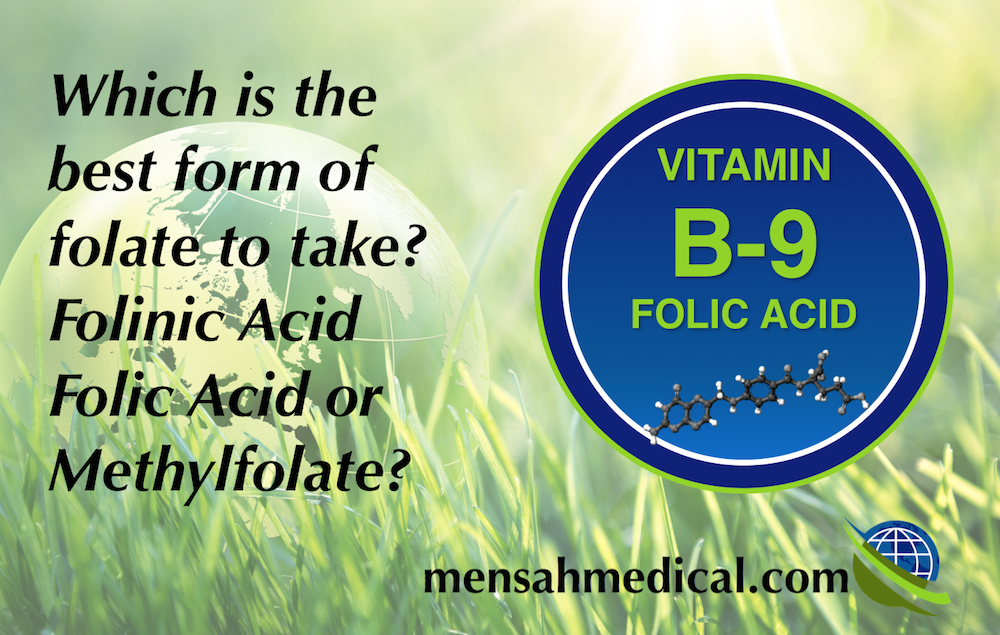Folic Acid Supplements and The Benefits of Taking Methylfolate:
Folic acid supplements, also called Vitamin B-9, are a way to take concentrated amounts of folate, which is naturally found in many foods including green leafy vegetables, and fortified in pasta, and bread. Folic acid helps us utilize proteins in our bodies, form new blood cells, and create new DNA. Many medical studies have promoted folic acid supplements for the prevention of neural tube defects in infants as well as the prevention of heart disease, depression, Alzheimer’s disease, and type 2 diabetes.
Proponents of folic acid supplements often think that more is better, both in dose amount and duration of supplementation. In our practice, we have seen the negative side effects of indiscriminate folic acid supplementation. It is not a supplement that should be taken long-term without specific biochemical laboratory testing and evaluation due to the very negative side effects that could arise. It is not only important to know who would benefit from taking folic acid and how much is beneficial, but there is also a need to understand which form is best for each individual patient.
What many people (especially practitioners) fail to understand the duality of folic acid activity. In one area, it’s a donor of methyl, so for an undermethylator, they think folic acid or methylfolate is a great thing. In actuality, that’s not correct because, in the nucleus, which is the command center of the cell, where we are trying to affect change, folic acid removes methyl. This can alter many cellular mechanisms including detoxification. This is because all forms of folate strip methyl at the level of DNA. That same folic acid works differently outside the nucleus of the cell where it actually donates some methyl into the system.
Yes, Methylated Folate Works Faster
Many people have come to believe that methylated folate is the best form of folate to take for optimal health, regardless of their methylation status and other biochemical imbalances. This is not entirely accurate.
Let’s address a few issues regarding methylated folate and folic acid that has been circulating the internet lately, and hopefully help our patients understand the purpose of methylated folate and when it should not be the preferred choice of folic acid supplements.
Faster is not always better, although some folks think that using methylated folate is a better option because methylated folate is assimilated by the body faster. The different forms of folate, in general, will be converted to the same end product overall. However, a person who is overmethylated would not want to take methylated folate because it will add a small amount of methyl before it removes methyl.
Folic Acid Supplements: Why Process Doesn’t Matter As Much
Most folks misunderstand the process involved in the metabolism of folic acid versus methylated folate. This is the key to understanding the difference between how folate gets into the cell, or the time it takes to do that, versus the end goal of having a physiological effect from taking the particular form of folate you have ingested.
Folic acid doesn’t have to be de-methylated, but methylated folate does. Even though methylated folate gets into the system faster, it doesn’t actually begin to work faster than folic acid would, because there is the extra step of de-methylation before it can be utilized. It is only absorbed faster. It still needs processing. Quicker absorption has to go through longer processing and can ultimately take longer to complete the utilization process.
It’s like the difference between taking a direct flight to a city and taking a connecting flight to the same city. There are more steps and more delays when you take a connecting flight that re-routes you through another city. One way takes longer. One way is more direct. Once something enters a cell there is a whole lot that goes on. Whether you take a direct route or a re-routed path makes little difference in the end. By the time it is all said and done these pieces are all moving in the same direction. The only difference we are talking about is the rate at which they are moving.
The Dangers of Methylated Folate
Methylated folate is not a one size fits all folic acid supplement. For some, it can have adverse effects, and unless you are tested for your methylation status, you do not know whether or not it will be beneficial or detrimental to you.
Let me pose a question to you. What happens to that methyl contained in the methylated folate? That methyl is going to get absorbed into your body. If you are giving that methyl to a person who is overmethlyated it is like adding kerosene to put out a fire. You’ll make your methylation imbalance worse. Overmethylated patients should use folic acid that is not methylated. If you are overmethylated do not take methylated folate or any other product that is methylated.
But Folic Acid is Synthetic, and That’s Bad, Right?
Folic acid is synthetic, yes. But it is not unhealthy. It works, and it works better than natural forms in most cases. Folic acid is used to fortify foods and is found in most dietary supplements, simply because it is more stable and bioavailable than natural folates. Historically, since the days of Carl Pfeiffer, the pioneer in orthomolecular medicine, we have traditionally used folic acid for our patients and it has shown to be extremely efficient and effective. The notion that folic acid is synthetic and is not effective is incorrect. Anytime you take something out of nature and take it into a lab, it is synthetic. Folic acid works.
Folinic acid is metabolically active. Yes, that is correct. This means that folinic acid does not require enzymatic conversion before it can be utilized. Folinic acid can be found naturally in foods, but to benefit from folinic acid, it has to be prescribed in therapeutic doses for our patients. There are times when we may prefer the use of folinic acid to folic acid when we work with certain patient populations. Folinic acid has its best utility in autism, as we have seen over the years of research and clinical practice at Pfeiffer Treatment Center, now closed, at the Walsh Research Institute, and at the Mensah Medical Clinic.
Much discussion surrounding methylated folate comes from genetic testing and the MTHFR paradigm, which is neither an accurate assessment nor an appropriate guide for true methylation disorders. MTHFR testing is very significant in the realm of autism and in multiple sclerosis, however, in the area of mental health, it is strikingly inconsistent and dubious at best. The proof is in the pudding. Truly undermethylated people do not do well on methylated folate after two to three months. In fact, on quite the contrary, many people report worsening symptoms. In summary, we have history, research, and patient outcomes that support all that we’ve been discussing the benefits of different forms of folic acid and their appropriate usage as well as challenges. Please remember everyone is unique so let’s not generalize regarding folic acid supplement use. There is only one of you. Even if you are a twin, there is still only one epigenetic you.
Albert Mensah, MD, BCIP
 As a physician in this specialized field since 2005, Dr. Mensah, board certified in integrative pediatrics by the American Association of Integrative Medicine, has treated over 3,000 patients with advanced targeted nutrient therapy. He serves on the board at Walsh Research Institute and serves as a clinical instructor for WRI’s international doctor training programs around the world. Dr. Albert Mensah received his undergraduate degree from Northwestern University (Evanston, Illinois) and his medical degree from Finch University of Health Sciences-Chicago Medical School. Dr. Mensah’s residency was in Family Medicine at Swedish Covenant Hospital (Chicago). Following residency, he completed additional fellowship training in academic development at JHS Cook County Hospital (Chicago). From 2005 to 2008, Dr. Mensah treated patients at the former Pfeiffer Treatment Center, a not-for-profit organization and outpatient clinic specializing in the treatment of biochemical imbalances including children with autism. Prior to joining Pfeiffer, Dr. Mensah was a physician at Melrose Park Clinic in Illinois. Dr. Mensah co-founded Mensah Medical in 2008 with Dr. Judith Bowman.
As a physician in this specialized field since 2005, Dr. Mensah, board certified in integrative pediatrics by the American Association of Integrative Medicine, has treated over 3,000 patients with advanced targeted nutrient therapy. He serves on the board at Walsh Research Institute and serves as a clinical instructor for WRI’s international doctor training programs around the world. Dr. Albert Mensah received his undergraduate degree from Northwestern University (Evanston, Illinois) and his medical degree from Finch University of Health Sciences-Chicago Medical School. Dr. Mensah’s residency was in Family Medicine at Swedish Covenant Hospital (Chicago). Following residency, he completed additional fellowship training in academic development at JHS Cook County Hospital (Chicago). From 2005 to 2008, Dr. Mensah treated patients at the former Pfeiffer Treatment Center, a not-for-profit organization and outpatient clinic specializing in the treatment of biochemical imbalances including children with autism. Prior to joining Pfeiffer, Dr. Mensah was a physician at Melrose Park Clinic in Illinois. Dr. Mensah co-founded Mensah Medical in 2008 with Dr. Judith Bowman.
